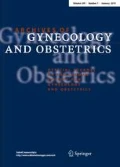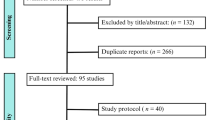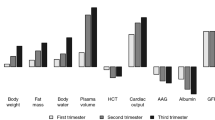Abstract
Introduction
Intrauterine infection is frequently associated with pregnancy loss in pregnant women.
Discussion
This article reviews the role of Gram-negative bacterial infection in various complications related to early pregnancy and subsequent pregnancy loss. Here we discus the pathways of ascending intrauterine infection, microbiology and the pathophysiology of such infections. The clinical impact, therapy, consequences, prevention and implications of Gram-negative bacterial infections in women during their reproductive life span is also discussed. This article also makes an attempt to discuss our studies and findings, related to the effect of the LPS component of the Gram-negative bacterial endotoxin on preimplantation stage embryonic development and implantation. This early phase of pregnancy remains mostly unnoticed by the mother as well as the health care provider, and therefore holds more threat to the life of the fetus and the mother. The molecular mechanisms of LPS-induced pregnancy losses through abnormal embryonic development, implantation failure, and preterm labor and birth with specific references to the role of proinflammatory cytokines like IL-1 and TNF are discussed.
Conclusion
Once these inflammatory mediators have increased in the feto-maternal tissues, it may be too late or harmful to try and prevent the adverse outcomes of pregnancy.


Similar content being viewed by others
References
Aderem A, Ulevitch RJ (2000) Toll like receptors in the induction of the innate immune response. Nature 406:782–787
Andrews GK, Mc Master MT, Liang L, Kover K, Dey SK (1995) Cytokine gene expression and distribution of inflammatory leukocytes in the periimplantation mouse uterus. In: Dey SK (ed) Molecular and cellular aspects of preimplantation processes. Serono Symposia USA, Norwell Massachussets. Springer New York Berlin Heidelberg, pp 205–230
Ault KA, Faro S (1993) Current diagnostic criteria and treatment guidelines. Postgrad Med 93:89–91
Bagavandoss P, Wiggins RC, Kunkel SL, Remick DG, Keyes PL (1990) Tumor necrosis factor production and accumulation of inflammatory cells in the corpus luteum of pseudopregnancy and pregnancy in rabbits. Biol Reprod 42:367–376
Benirschke K (1965) Routes and types of infection in the fetus and the newborn. Am J Dis Child 28:714–721
Bejar R, Curvellop V, Davis C, Gluck L (1981) Premature labor. II. Bacterial sources of phospholipase. Obestet Gynecol 57:479–482
Berger RE, Karp LE, Williamson RA, Koehler J, Moore DE, Holmes KK (1982) The relationship of pyospermia and seminal fluid bacteriology to sperm function as reflected in the sperm penetration assay. Fertil Steril 37:557–564
Berry SM, Romero R, Gomez R, Puder KS, Ghezzi F, Cotton DB (1995) Premature parturition is characterized by in utero activation of the fetal immune system. Am J Obstet Gynecol 173:1315–1320
Bischof P, Campana A (2000) Molecular mediators of implantation. Baillieres Best Pract Res Clin Obstet Gynaecol 14:801–814
Bischof P, Messer A, Camapana A (2000) Mechanisms of endometrial control of trophoblast invasion. J Reprod Fertil Suppl 55:65–71
Blake DR, Duggan A, Quinn T, Zenilwan J, Joffe A (1998) Evaluation of vaginal infections in adolescent women: can it be done without a speculum? Pediatrics 102:939–944
Brocklehurst P (1999) Interventions for treating bacterial vaginosis in pregnancy. Cochrane Library, issue 3
Burell R (1994) Human responses to bacterial endotoxins. Circ Shock 43:137–153
Carey CJ (2000) Metronidazole to prevent preterm delivery in pregnant women with aymptomatic bacterial vaginosis. N Engl J Med 342:534–540
Carson DD, Bagchi I, Dey SK, Enders AC, Fazlebas AT, Lessey BA, Yoshinaga K (2000) Review: embryo implantation. Dev Biol 223:217–237
Cavallion JM, Haeffner-Cavallion N (1990) Signals involved in interleukin-1 synthesis and release by lipopolysaccharide-induced monocytes, macrophages. Cytokine 2:313–329
Chow JC, Young DW, Golenbock DT, Christ WJ, Gusovsky F (1999) Toll-like receptor-4 mediates lipopolysaccharide-induced signal transduction. J Biol Chem 274:10689–10692
Cline EM, Randall PA, Oliphant G (1977) Hormone-mediated oviductal influence on mouse embryo development. Fertil Steril 28:766–771
Cram LF, Zapata MI, Toy EC, Baker B III (2002) Genitourinary infections and their association with preterm labor. Am Fam Physician 65:241–248
De M, Sanford TR, Wood GW (1993) Expression of interleukin-1, interleukin-6, and tumor necrosis factor alpha in mouse uterus during the peri-implantation period of pregnancy. J Reprod Fertil 97:83–89
Deb K, Chaturvedi MM, Jaiswal YK (2000) Developmental expression of IL-1α, IL-1β, TNF-α and CSF-1 in preimplantation mouse embryos. In: The 69th Annual Meeting of the Society of Biological Chemists, India, p J2
Deb K, Chaturvedi MM, Jaiswal YK (2004) Gram-negative bacterial endotoxin-induced infertility: a birds eye view. Gynecol Obstet Invest 57:224–232
Deb K, Chaturvedi MM, Jaiswal YK (2004) A “minimum dose” of LPS required for implantation failure: assessment of its effect on the maternal reproductive organs and IL-1α expression in mouse. Reproduction (submitted)
Diemer T, Huwe P, Michelmann HW, Mayer F, Schiefer HG, Weidner W (2000) Escherichia coli-induced alterations of human spermatozoa. An electron microscopy analysis. Int J Androl 23:178–186
Di Renzo GC, De Domenico P (2000) Cervico-inguinal microbiology, vaginal pH, infections, and premature labor. Acta Biomed Ateneo Parmense 71:513–517
Donder GG, Vereecken A, Bosmans E, Dekeersmaecker A, Salembier G, Spitz B (2002) Definition of a type of abnormal vaginal flora that is distinct from bacterial vaginosis: aerobic vaginitis. Br J Obstet Gynaecol 109:34–43
Dostal J, Oborna I, Talas M, Chrastinova L, Machovska K (1996) Infectious agents and treatment of infertility with IVF and ET. Ceska Gynekol 61:144–147
Dumoulin JC, Menheere PP, Evers JL, Kleukers AP, Pieters MH, Bras M, Geraedts JP (1991) The effects of endotoxins on gametes and preimplantation embryos cultured in vitro. Hum Reprod 6:730–734
Edqvist L, Fredriksson G, Kindahl H (1984) Some aspects of endotoxins and corpus luteum function in ruminants. In: Panel proceedings of nuclear techniques in tropical animal diseases. International Atomic Energy Agency, Vienna, pp 57–68
Foley GL, Schlafer DH, Elsasser TH, Mitchell M (1993) Endotoxemia in pregnant cows: comparison of maternal and fetal effects utilizing the chronically catheterized fetus. Theriogenology 39:739–762
Fredriksson G, Kindahl H, Stabenfeldt G (1986) Endotoxin-induced and prostaglandin mediated effects on the corpus luteum in the mare. Theriogenology 25:309–316
Frey EA, Miller DS, John TSI, Sundam A, Bazil V, Espevik T, Finlay BB, Wright SD (1992) Soluble CD14 participates in the response of cells to lipopolysaccharide. J Exp Med 176:1665–1667
Geng Y, Zhang B, Lotz M (1993) Protein tyrosine kinase activation is required for lipopolysaccharide induction of cytokines in human blood monocytes. Immunology 151:6692–6700
Gerwin N, Jia GQ, Kulbacki R, Gutierrez-Ramos JC (1995) Interleukin gene expression in mouse preimplantation development. Dev Immunol 4:169–179
Gibbs RS, Romero R, Hiller SL, Eschenbach DA, Sweet RL (1992) A review of premature birth and subclinical infection. Am J Obstet Gynecol 166:1515–1528
Giri SN, Stabenfeldt GH, Bruss MI, BonDurant RH, Osburn BI (1990) Effect of endotoxins on circulating levels of eicosanoids, progesterone, cortisol, glucose, and lactic acid, and abortion in pregnant cows. Vet Microbiol 21:211–231
Goldenberg RL, Hauth JC, Andrews WW (2000) Intrauterine infection and preterm delivery. N Engl J Med 342:1500–1507
Gomez R, Romero R, Mazor M, Ghezzi F, David C, Yoon BH (1997) Role of infection in preterm labour and delivery. In: Elder MG, Romero R, Lamont RF (eds) Preterm labor. Churchill Livingstone, New York, pp 85–125
Gorospe WC, Hughes FM, Spangelo BL (1992) Inlerleukin-6: effects on and production by rat granulose cells in vitro. Endocrinology 130:1750–1752
Hay PE, Lamont RF, Taylor-Robinson D, Morgan DJ, Ison C, Pearson J (1994) Abnormal bacterial colonization of the genital tract and subsequent preterm delivery and late miscarriage. BMJ 308:295–298
Hillier S (1998) The vaginal microbial ecosystem and resistance to HIV. AIDS Res Hum Retroviruses 14:S17–S21
Hillier S, Holmes KK (1999) Bacterial vaginosis. In: Holmes KK et al (eds) Sexually transmitted diseases, 3rd edn. McGraw Hill, New York, pp 563–586
Jaattela M, Ilvesmaki V, Voutilainen R, Stenman U, Saksela E (1990) Tumor necrosis factor alpha is a potent inhibitor of adrenocorticotrophin-induced cortisol production and steroidogenic P450 enzyme gene expression in cultured human fetal adrenal cells. Endocrinology 128:623–629
Jaiswal YK, Deb K, Chatturvedi MM (2001) Lipopolysaccharide induced histopathological alterations in murine reproductive organs: a probable cause of failure of blastocyst implantation. In: The 1st Conference of Biotechnology Society of India (Biotechcon-2001), pp 22–23
Jaiswal YK, Deb K, Chatturvedi MM (2001) Effect of LPS on the development of in-vivo produced preimplantation mouse embryos. In: The 70th Annual Meeting of the Society of Biological Chemist, India, p 197
Kauma SW (2000) Cytokines in implantation. J Reprod Fertil 55:31–42
Keelan JA, Coleman M, Mitchell MD (1997) The molecular mechanisms of term and preterm labor: recent progress and clinical implications. Clin Obstet Gynaecol 40:460–478
Kelly RW, King AE, Critchley HO (2001) Cytokine control in human endometrium. Reproduction 121:3–19
Kielian TL, Blecha F (1995) CD14 and other recognition molecules for lipopolysaccharides: a review. Immunopharmacology 29:187–205
Kirschning CJ, Wesche H, Merrill Ayres T, Rothe M (1998) Human toll like receptor 2 confers responsiveness to bacterial lipopolysaccharide. J Exp Med 188:2091–2097
Kurman RJ (1982) Benign diseases of the endometrium. In: Blaustein A (ed) Pathology of the female genital tract. Springer, New York Berlin Heidelberg, pp 279–284
Lamont RF (1994) Bacterial vaginosis. In: Studd JWW, Jardine-Brown C (ed) The year book of the Royal College of Obestetrics and Gynecologists, 1994. Parthenon, London, pp 149–160
Lamont RF (2000) Antibiotics for the prevention of preterm birth. N Engl J Med 342:581–583
LaPolt PS, Day JR, Lu JK (1990) Effects of estradiol and progesterone on early embryonic development in aging rats. Biol Reprod 43:843–850
Liggins GC (1990) The foetal role in the initiation of parturition in the ewe. In: Wolstenhome GEW, O’Connor M (eds) Foetal autonomy (CIBA Foundation Symposium). Churchill, London, p 218
Lim H, Gupta RA, Ma WG, Paria BC, Moller DE, Morrow JD, Du Bois RN, Trzaskos M, Dey SK (1999) Cyclooxygenase-2 derived prostacyclin mediates embryo implantation in the mouse via PPARdelta. Genes Dev 13:1561–1574
Lurie S, Woliovitch I, Rotmensch S, Sadan O, Glezerman M (2001) Value of vaginal culture in management of acute vaginitis. Arch Gynecol Obstet 265:187–189
McMaster MT, Dey SK, Andrews GK (1993) Association of monocytes and neutrophils with early events of blastocyst implantation in mice. J Reprod Fertil 99:561–569
Mikamo H, Sato Y, Hayasaki Y, Hua YX, Tamaya T (2000) Vaginal microflora in healthy women with Gardnerella vaginalis. J Infect Chemother 6:173–177
Mitchell MD, Romero RJ, Edwin SS, Trautman MS (1995) Prostaglandins and parturition. Reprod Fert Dev 7:623–632
Mota A, Prieto E, Carnall V, Exposto F (2000) Evaluation of microscopy methods for the diagnosis of bacterial vaginosis. Acta Med Port 13:77–80
Nomura F, Akashi S, Sakao Y, Sato S, Kawai T, Matsumoto M, Nkanishi K, Kimotio M, Miyake K, Takeda K, Akira S (2000) Cutting edge: endotoxin tolerance in mouse peritoneal macrophages correlates with down regulation of surface toll-like receptor 4 expression. J Immunol 164:3476–3479
Osmer RG, Blaser J, Kuhn W, Tschesche H (1995) Interleukin-8 synthesis and the onset of labor. Obstet Gynaecol 86:223–229
Pampfer S, Wuu YD, Vanderhyden I, De Hertogh R (1994) Expression of tumor necrosis factor-α receptors and selective effect of TNF-α on the inner cell mass in mouse blastocyst. Endocrinology 134:206–212
Paria BC, Huet-Hudson YM, Dey SK (1993) Blastocysts state of activity determines the window of implantation in the receptive mouse uterus. Proc Natl Acad Sci USA 90:10159–10162
Paria BC, Lim H, Das SK, Reese J, Dey SK (2000) Molecular signaling in uterine receptivity for implantation. Semin Cell Dev Biol 11:67–76
Pybus V, Onderdonk A (1999) Microbial interactions in the vaginal ecosystem, with emphasis on the pathogenesis of bacterial vaginosis. Microbes Infect 1:285–292
Raetz CRH (1993) Bacterial endotoxins: extra ordinary lipids that activate eukaryotic signal transduction. J Bacteriol 175:5745–5755
Ralph SG, Rutherford AJ, Wilson JD (1999) Influence of bacterial vaginosis on conception and miscarriage in the first trimester: cohort study. BMJ 39:220–223
Randall GW, O’Connor EF, Gantt PA (1991) Synergy between tumor necrosis factor and endotoxin decreases early embryo development in vitro. J In Vitro Fertil Embryo Transf 8:304–307
Rietschel ET, Kirikae T, Schade FU, Mamat U, Schmidt G, Loppnow H, Ulmer AJ, Zahringer U, Seydel U, di Padova F, Schreier M, Brade H (1994) Bacterial endotoxins: molecular relationships of structure to activity and function. FASEB J 8:217–225
Romero R, Mazor M, Tartakovsky B (1991) Systemic administration of interleukin-1 induces preterm parturition in mice. Am J Obstet Gynecol 165:969–971
Romero R, Munoz H, Gomez R (1995) Two thirds of spontaneous abortion/fetal deaths after generic amniocentesis are the result of a pre-existing sub-clinical inflammatory process of the amniotic cavity. Am J Obstet Gynecol 172:261
Romero R, Maymon E, Pcora P, Gomez R, Mazor M, Yoon BH (2000) Further observations on the fetal inflammatory response syndrome: a potential homeostatic role for the soluble receptors of tumor necrosis factor alpha. Am J Obstet Gynecol 183:1070–1077
Romero R, Espionoza J, Chaiworapongsa T, Kalache K (2002) Infection and prematurity and the role of preventive strategies. Semin Neonatol 7:259–274
Safro E, O’Neill C, Saunders DM (1990) Elevated luteal phase estradiol:progesterone ratio in mice causes implantation failure by creating a uterine environment that suppresses embryonic metabolism. Fertil Steril 54:1150–1153
Saito S, Matsuura M, Tominanga K, Kirikae T, Nakano M (2000) Important role of membrane associated CD14 in the induction of INF-beta and subsequent nitric oxide production by murine macrophages in response to bacterial lipopolysaccharide. Eur J Biochem 267:37–45
Satoh T, Kumamota Y, Hirose T (1994) Studies on the local immune response in mouse model of experimental Escherichia coli intrauterine infections. Kansenshogaku Zasshi 68:1381–1389
Schlafer DH, Yuh B, Foley GL, Elssaser TH, Sadowsky D, Nathanielsz PW (1994) Effect of salmonella endotoxin administered to the pregnant sheep at 133–142 days gestation on fetal oxygenation, maternal and fetal adrenocorticotropic hormone and cortisol, and maternal plasma tumor necrosis factor α concentrations. Biol Repod 50:1297–1302
Shalaby MR, Laegreid WW, Amman AJ, Liggitt HD (1989) Tumor necrosis factor α associated uterine endothelial injury in vivo. Influence of dietary fat. Lab Invest 61:564–570
Sharkey ME, Adler RR, Brenner CA, Nieder GL (1996) Matrix metalloprotinase expression during mouse preimplantation development. Am J Reprod Immunol 36:72–80
Silen ML, Firpo A, Morgello S, Lowry SF, Francus T (1989) Interleukin-1α and tumor necrosis factor alpha cause placental injury in rats. Am J Pathol 135:239–244
Silver RM, Lohner S, Chen CL (1993) Tumor necrosis factor-alpha mediates LPS induced abortion: evidence from the LPS-resistant murine strain C3H/HeJ [abstract]. J Soc Gynecol Investig
Silver RM, Lohner WS, Dayner RA, Mitchell MD, Branch DW (1994) Lipopolysaccharide induced fetal death: the role of tumor necrosis factor alpha. Biol Reprod 50:1108–1112
Silver RM, Edwin SS, Umar F, Dubley DJ, Branch DW, Mitchell MD (1997) Bacterial lipopolysaccharide-mediated murine fetal death: the role of interleukin-1. Am J Obstet Gynaecol 176:544–549
Simon C, Moreno C, Remohi J, Pellicer A (1998) Cytokines and embryo implantation. J Reprod Immunol 39:117–131
Strus M, Malinowska M, Heczko PB (2002) In vitro antagonistic effect of Lactobacillus on organisms associated with bacterial vaginosis. J Reprod Med 47:41–46
Sweet MJ, Hume DA (1996) Endotoxin signal transduction in macrophages. J Leukoc Biol 60:8–26
Tabibzadeh S (1998) Molecular control of the implantation window. Hum Reprod Update 4:465–471
Tapping RI, Tobias PS (1997) Cellular binding of soluble CD14 requires lipopolysaccharide (LPS) and LPS-binding protein. J Biol Chem 272:23157–23164
Taylor CC, Terranova PF (1996) Lipopolysaccharide inhibits in vitro luteinizing hormone-stimulated rat ovarian granulose cell estradiol but not progesterone secretion. Biol Reprod 54:1390–1396
Telleria CM, Ou J, Sugino N, Ferguson S, Gibori G (1998) The expression of interleukin-6 in the pregnant rat corpus lutuem and its regulation by progesterone and glucocorticoid. Endocrinology 139:3597–3605
Terranova PF, Mongomery-Rice V (1997) Review: cytokine involvement in ovarian process. Am J Reprod Immunol 37:50–63
Thompson AJ, Greer MR, Young A, Boswell F, Telfer JF, Cameron IT, Norman JE, Compbell S (1999) Expression of intracellular adhesion molecules ICAM-1 and ICAM-2 in human endometrium: regulation by interferon-γ. Mol Hum Reprod 5:64–67
Van-Meir C, Ramier MM, Matthews SG, Calder AA, Keirse MJ, Challis JR (1997) Chronic prostaglandin catabolism is decreased in the lower uterine segment with term labor. Placenta 18:109–114
Vassilli P (1992) The pathophysiology of tumor necrosis factors. Annu Rev Immunol 10:411–452
Vesy CJ, Kitchens RL, Wolfbauer G, Albers JJ, Munford RS (2000) Lipopolysaccharide-binding protein and phospholipid transfer protein release lipopolysaccharides from gram-negative bacterial membranes. Infect Immun 68:2410–2417
Wang L, Zhang W (1998) Detecting cytokines in patients with preterm premature rupture of membrane. Chung Hua I Hsueh Tsa Chih 78:216–217
Wegmann TG, Athanassakis I, Guilbert I, Branch D, Dy M, Menu E (1989) The role of M-CSF and GM-CSF in fostering placental growth, fetal growth and fetal survival. Transplant Proc 21:566–568
Wrathall AE, Wray C, Bailey J, Wells DE (1978) Experimentally induced bacterial endotoxemia and abortion in pigs. Br Vet J 134:225–230
Acknowledgments
We thank the All India Council for Technical Education (AICTE), New Delhi; the Rockefeller Foundation, New York, USA, for financial support; and the Council for Scientific and Industrial Research (CSIR), New Delhi for Senior Research Fellowship to KD.
Author information
Authors and Affiliations
Corresponding author
Rights and permissions
About this article
Cite this article
Deb, K., Chaturvedi, M.M. & Jaiswal, Y.K. Comprehending the role of LPS in Gram-negative bacterial vaginosis: ogling into the causes of unfulfilled child-wish. Arch Gynecol Obstet 270, 133–146 (2004). https://doi.org/10.1007/s00404-004-0623-0
Received:
Accepted:
Published:
Issue Date:
DOI: https://doi.org/10.1007/s00404-004-0623-0




